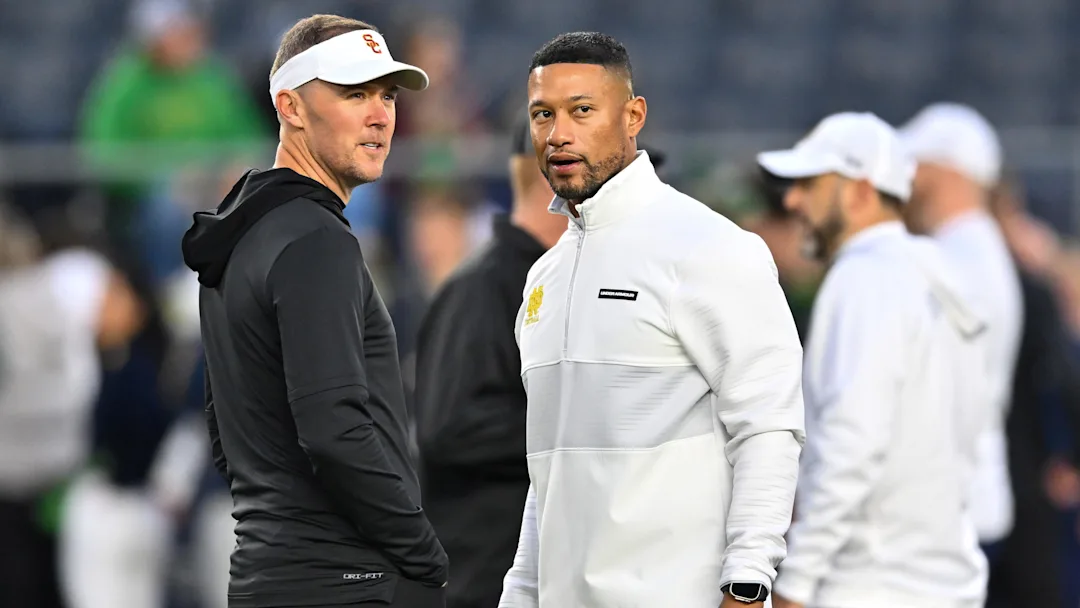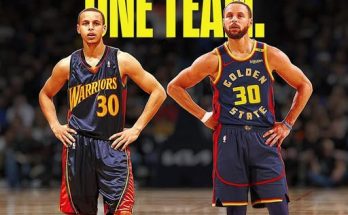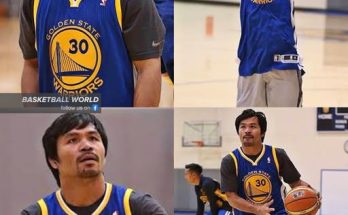In the intense, high-stakes world of college football, every coach brings a unique style and energy to the sidelines. For Notre Dame’s head coach Marcus Freeman, the latest showdown against a formidable USC Trojans squad became a moment where he tapped into an unexpected source of inspiration: the relentless, larger-than-life energy of WWE wrestling. While the gridiron and the wrestling ring may seem worlds apart, Freeman’s fiery passion and unyielding grit echoed the same spirit that drives WWE superstars, and it was this electric intensity that helped keep Notre Dame’s hopes alive in what could have been a daunting matchup.
From the opening whistle, the Notre Dame-USC game was marked by tension and physicality, two teams battling not just for bragging rights but for critical positioning in their conference and national rankings. USC, with its high-powered offense and disciplined defense, seemed poised to dominate. Notre Dame, though talented, had been written off by many experts and fans alike, viewed as underdogs in this marquee rivalry. Yet, as the game unfolded, it was clear that Marcus Freeman had brought something special to the table — a mindset inspired by WWE’s hallmark toughness, showmanship, and refusal to back down.
Freeman’s journey to this moment is a testament to resilience and adaptation. A former NFL linebacker, he transitioned into coaching with a reputation for defensive prowess and a calm, composed demeanor. However, as a young head coach facing one of college football’s most storied rivals, he understood the importance of not just strategy, but mindset. “You’ve got to bring intensity that the other team doesn’t expect,” Freeman shared after the game. “Sometimes that energy comes from unexpected places. For me, it was the WWE — their athletes show toughness, heart, and never quit, and that’s the exact mindset we needed.”
That mindset translated into how Notre Dame played. Throughout the game, the Fighting Irish defense showed a dogged determination, matching USC’s physicality blow for blow. On the sidelines, Freeman’s animated gestures, passionate calls, and intense presence injected energy into the team. It was reminiscent of a WWE manager rallying their fighters between rounds — a combination of motivational fire and tactical guidance. The players fed off that energy, making key stops and forcing turnovers at critical junctures.
One defining moment came late in the third quarter. Down by two scores and facing a tough third-and-long situation deep in their own territory, Notre Dame’s offense appeared to be in trouble. Rather than showing frustration or doubt, Freeman’s sideline presence grew even more vibrant. His shouting commands, fist pumps, and encouraging nods reminded spectators of the passionate intensity WWE personalities bring to their craft. Fueled by their coach’s example, the Fighting Irish converted the play and sustained a drive that would ultimately bring them back into contention.
The parallels between football and professional wrestling may surprise some, but at their core, both are about performance under pressure, perseverance, and mental toughness. WWE stars are known for their ability to endure physically punishing situations and still find ways to rally. They create moments that inspire not just themselves but millions of fans watching from around the world. Freeman, recognizing this, used that same concept to galvanize his team in a game that could have easily slipped away.
Off the field, Freeman’s respect for WWE’s energy isn’t new. He has spoken in previous interviews about admiring the dedication and work ethic of WWE performers, who train rigorously and maintain a disciplined lifestyle to stay at peak performance. What made this particular game stand out was how Freeman directly applied those lessons to the football field, channeling the spirit of WWE’s resilience during Notre Dame’s most challenging moments.
Freeman’s approach also extended beyond just emotional energy. His strategic use of timeouts, aggressive defensive calls, and unexpected offensive plays showed a coach unafraid to take risks. This willingness to embrace chaos and unpredictability mirrored WWE’s flair for surprise twists and dramatic comebacks. The Fighting Irish were no longer just playing football; they were telling a story of determination, toughness, and heart.
Fans and analysts alike noticed the shift. Social media buzzed with comparisons of Freeman to legendary WWE figures known for their never-say-die attitude. Commentators praised his sideline charisma, noting that his energy seemed contagious. “You could feel it in the stands and on the broadcast,” said one commentator. “Freeman brought a level of fire and passion that helped keep Notre Dame in the game when many thought they’d fold.”
Players also credited Freeman’s intensity for inspiring their performance. Linebacker Jack Kiser, who recorded a key interception late in the fourth quarter, remarked, “Coach was like a WWE champion out there, fired up and demanding our best. It pushed us to make plays we might not have made otherwise.”
The Notre Dame-USC rivalry has always been about more than just the game itself. It’s a cultural event steeped in tradition, pride, and high expectations. To face such pressure and still rise, fueled by an unconventional source like WWE, showed Freeman’s creativity and leadership. It’s a reminder that motivation comes in many forms and that sometimes, breaking away from traditional coaching norms can spark extraordinary results.
As the game clock ticked down, Notre Dame’s chances of pulling off a comeback remained slim but very much alive. The Fighting Irish executed a series of clutch plays, their confidence bolstered by the unrelenting energy emanating from their coach. When the final whistle blew, the score may not have reflected a decisive victory, but the spirit and grit displayed had certainly won over the hearts of fans and critics alike.
Freeman’s WWE-inspired energy was more than a sideline show; it was a strategic masterstroke. It demonstrated that coaching is not just about schemes and X’s and O’s, but about emotional leadership, psychological edge, and embracing the spectacle that is college football. For Notre Dame, it was a performance worthy of their storied legacy — tough, passionate, and never giving up, no matter the odds.
In the aftermath, Freeman’s embrace of WWE grit has sparked conversations about the evolving nature of coaching. More than ever, coaches are recognizing the power of mindset and energy as critical factors in winning games. Marcus Freeman’s bold fusion of football strategy and wrestling-inspired tenacity is a perfect example of this new wave of leadership.
Looking ahead, Notre Dame’s season remains full of challenges, but also promise. If there’s one thing Freeman has proven, it’s that when the Fighting Irish face adversity, they do so with heart and unshakable resolve. Whether that comes from the trenches of football or the squared circle of WWE, this coach’s passion is undeniable and contagious.
For fans eager to see what comes next, Marcus Freeman’s WWE-fueled spirit offers a thrilling glimpse of how Notre Dame football will be played under his leadership — with intensity, showmanship, and an unyielding will to win.



